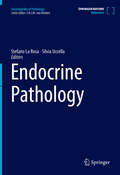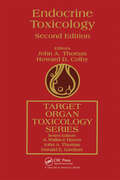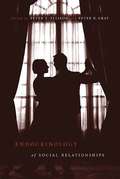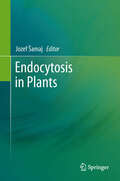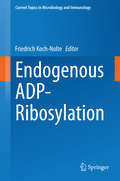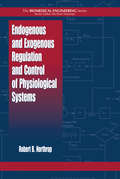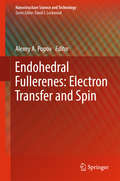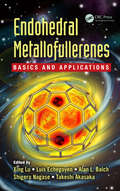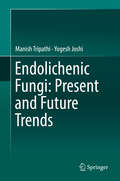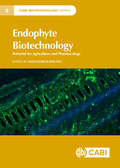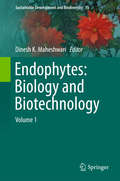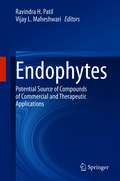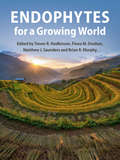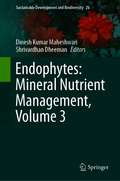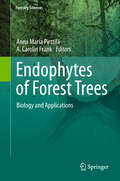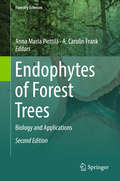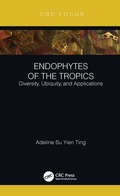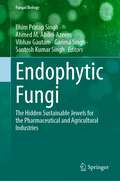- Table View
- List View
Endocrine Pathology (Encyclopedia of Pathology)
by Stefano La Rosa Silvia UccellaThis encyclopedia volume covers the complete field of endocrine pathology – from Acidophil Stem Cell Adenoma to Waterhouse-Friderichsen syndrome. The alphabetically arranged entries, each of which provides a detailed description of a specific pathological disease pattern, allow readers to quickly and easily find the information they need.
Endocrine Toxicology (Target Organ Toxicology Series)
by J. Charles Eldridge James T. StevensWith contributions by international experts in academia, chemical manufacturing, government research laboratories, regulatory agencies, and private consulting, this guide explores the potentially damaging influence of environmental agents on the endocrine system. It examines endocrine toxicology's increased importance in environmental safety issues
Endocrine Toxicology (Target Organ Toxicology Series)
by John A. Thomas Howard D. ColbyThis text presents a range of topics from the molecular events surrounding hormone actions to epidemiologic studies of the effects of environmental and occupational chemicals on reproductive organs. The endocrine systems covered include the adrenal cortex, thyroid and parathyroid, gonads, and the endocrine pancreas. Of particular importance are the
Endocrinology of Social Relationships
by Peter T. Ellison Peter B. GrayIn social relationships―whether between mates, parents and offspring, or friends―we find much of life’s meaning. But in these relationships, so critical to our well-being, might we also detect the workings, even directives, of biology? This book, a rare melding of human and animal research and theoretical and empirical science, ventures into the most interesting realms of behavioral biology to examine the intimate role of endocrinology in social relationships. <P><P>The importance of hormones to reproductive behavior―from breeding cycles to male sexual display―is well known. What this book considers is the increasing evidence that hormones are just as important to social behavior. Peter Ellison and Peter Gray include the latest findings―both practical and theoretical―on the hormonal component of both casual interactions and fundamental bonds. The contributors, senior scholars and rising scientists whose work is shaping the field, go beyond the proximate mechanics of neuroendocrine physiology to integrate behavioral endocrinology with areas such as reproductive ecology and life history theory. Ranging broadly across taxa, from birds and rodents to primates, the volume pays particular attention to human endocrinology and social relationships, a focus largely missing from most works of behavioral endocrinology.
Endocytosis and Signaling (Progress in Molecular and Subcellular Biology #57)
by Christophe Lamaze Ian PriorThis book focuses on the context dependency of cell signaling by showing how the endosomal system helps to structure and regulate signaling pathways. The location and concentration of signaling nodes regulate their activation cycles and engagement with distinct effector pathways. Whilst many cell signaling pathways are initiated from the cell surface, endocytosis provides an opportunity for modulating signaling networks’ output. In this book, first a series of reviews describe the endocytic and endosomal system and show how these subcellular platforms sort and regulate a wide range of signaling pathway components and phenotypic outputs. The book then reviews the latest scientific insights into how endocytic trafficking and subcellular location modulate a set of major pathways that are essential to normal cellular function and organisms’ development.
Endocytosis in Plants
by Jozef ŠamajEndocytosis is a fundamental cellular process by means of which cells internalize extracellular and plasma membrane cargos for recycling or degradation. It is important for the establishment and maintenance of cell polarity, subcellular signaling and uptake of nutrients into specialized cells, but also for plant cell interactions with pathogenic and symbiotic microbes. Endocytosis starts by vesicle formation at the plasma membrane and progresses through early and late endosomal compartments. In these endosomes cargo is sorted and it is either recycled back to the plasma membrane, or degraded in the lytic vacuole. This book presents an overview of our current knowledge of endocytosis in plants with a main focus on the key molecules undergoing and regulating endocytosis. It also provides up to date methodological approaches as well as principles of protein, structural lipid, sugar and microbe internalization in plant cells. The individual chapters describe clathrin-mediated and fluid-phase endocytosis, as well as flotillin-mediated endocytosis and internalization of microbes. The book was written for a broad spectrum of readers including students, teachers and researchers.
Endogenous ADP-Ribosylation
by Friedrich Koch-NolteThis volume gathers the latest exciting findings on ADP-ribosylation from renowned experts in the field. It includes ten chapters, organized into the following three thematic sections: · Evolution and detection of endogenous ADP-ribosylation · ADP-ribosylation by the ARTC family of ADP-ribosyltransferases (R-S-E ARTs) · ADP-ribosylation by the ARTD family of ADP-ribosyltransferases (H-Y-E ARTs) The book will provide readers a better understanding of ADP-ribosylating toxins and their endogenous relatives. This provides a basis for developing novel toxin-neutralizing drugs and drugs targeting endogenous ADP-ribosyltransferase relatives.
Endogenous and Exogenous Regulation and Control of Physiological Systems (Biomedical Engineering Ser. #2)
by Robert B. NorthropFrom a biomedical engineering perspective, this book takes an analytic, quantitative approach to describing the basic components of physiological regulators and control systems (PRCs). In Endogenous and Exogenous Regulation and Control of Physiological Systems, the author provides grounding in the classical methods of designing linear and nonlinear systems. He also offers state-of-the-art material on the potential of PRCs to treat immune system ailments, most notably AIDS and cancer. The book focuses on certain "wet" physiological regulators, such as those using endocrine hormones as parametric control substances. Endogenous and Exogenous Regulation and Control of Physiological Systems includes simulations that illustrate model validations and the putative control of cancer and HIV proliferation. It explores novel, untried immunotherapies on the cutting-edge of PRC treatment and explores the latest technologies.
The Endogenous Energy-Saving Technological Change in China's Industrial Sector
by Xubo HeAs improving energy efficiency and increasing energy R&D investment may be the main means for China's industrial sector to achieve sustainable growth, this book attempts to unify energy use efficiency and energy R&D inputs into a standardized economic analysis framework. By distinguishing between energy R&D inputs and non-energy R&D inputs, this book draws on the research paradigm of neoclassical economics to clarify the basic concepts and endogenous mechanisms of energy-saving technological progress as a logical starting point. Under the framework of the existing endogenous growth theory analysis, the heterogeneous R&D inputs are divided into two different mechanisms that affect energy use efficiency, namely factor substitution effect and energy-efficient input increase effect, and a heterogeneous R&D input is constructed. This book constructed an analytical framework for endogenous energy-saving technological progress in the industrial sector based on heterogeneous R&D inputs; it established a mathematical model for the endogenous energy-saving technological advancement of the industrial sector based on heterogeneous R&D inputs; it estimated the energy-saving technological progress rate of 37 Chinese industrial sub-sectors from 1980 to 2010; fourth, it has empirically examined the relationship between the heterogeneous R&D investment in China's industrial sector and its energy-saving technological advancement rate.
Endogenous Opioids: From Basic Science to Biopsychosocial Applications (Advances in Neurobiology #35)
by Patrick L. Kerr Cristian Sirbu John M. GreggThis new volume provides a scientifically based exploration of the multifaceted world of endogenous opioids, including endorphins, enkephalins, dynorphins, endomorphins, and orphanin FQ/nociceptin, featuring a strong translational focus. Topics covered range from basic scientific investigations, to clinical applications, to investigations in areas such as oncology, childbirth, and disordered eating, to psychosocial contexts such as volunteering and positive emotions. One of the main goals of Endogenous Opioids is to provide recommendations for new directions in medical research and health policy that are rooted in sound scientific research.
Endohedral Fullerenes: Electron Transfer and Spin (Nanostructure Science and Technology)
by Alexey A. PopovThis book discusses recent progress in endohedral fullerenes – their production and separation techniques, as well as their characterization and properties. Furthermore, the book delves into the all-important issue of stability by investigating electron transfer between the encapsulated metal species and the carbon cage. It also reviews spin-based phenomena caused by the shielding of endohedral spin by the fullerene, and analyzes formation of the spin states by charge transfer as studied by electron spin resonance. Tuning of charge states of endohedral species and of spin states of both the cage and the cluster are explained. Finally, the book considers the recent discovery of magnetism in some endohedral fullerenes, and the potential for quantum computing.
Endohedral Metallofullerenes: Basics and Applications
by Xing Lu Luis Echegoyen Alan L. Balch Shigeru Nagase Takeshi AkasakaKnowledge on endohedral metallofullerenes (EMFs) has increased dramatically during the last decade. Numerous research findings have been reported, making it an opportune time to provide a systematic update on EMFs. Endohedral Metallofullerenes: Basics and Applications presents the most comprehensive review on all aspects of EMFs including their gen
Endolichenic Fungi: Present and Future Trends
by Manish Tripathi Yogesh JoshiThis book draws the reader into the latest debate on fungal diversity and the concept of lichen symbiosis. Chapters of this book cohere around four general themes: endolichenic fungi, isolation and culture, identification and bioactive potential. This is a highly informative book providing scientific insight for scholars interested in lichens and fungi. This research intrigues readers with this fascinating and less known fungal community residing inside lichens and arouses curiosity among lichenologists and mycologists about these fungi and their potential. This treatise provokes debate on the definition of lichen and its compositional organisms and invites further investigations on this topic by adding to the scholarly debate with various new perspectives on endolichenic fungi in the last chapter. Not only this, it also clarifies the differences between endolichenic fungi, mycorrhiza and lichenicolous fungi and the fungi found freely in air, water and soil and contributes to the development of the new field of endolichenic fungi. This book supports readers to build their knowledge through helpful case studies conducted throughout the globe and plentiful figures and illustrations and chemical structures of the novel compounds harvested from endolichenic fungi. This book covers both classical and cutting-edge technologies in the field of endolichenic fungi and offers step-by-step procedures for isolation and identification of endolichenic fungi and further contributes in how one can harvest the secondary metabolites from endolichenic fungi. This book shares the knowledge of some highly experienced authorities in the field of lichenology, mycology and endolichenic fungi and offers a first stop for specialists who need information about particular aspects in the field of endolichenic fungi. This research will equip researchers, professors, professionals working in this field to understand lichens and its intricate internal ecosystem with a fresh perspective and also enables readers to explore further through annotated references to other works.
Endolysosomal Voltage-Dependent Cation Channels (Handbook of Experimental Pharmacology #278)
by Christian Wahl-Schott Martin BielThis book covers the molecular structures and the cellular and in vivo function of endosomes and lysosomes, i.e. intracellular vesicles which are involved in many cellular processes such as endocytosis, intracellular trafficking, degradation of material from inside (e.g. autophagy) and outside the cell as well as exocytosis. Membranes of endolysosomal organelles contain an amazing number and diversity of ion channels. These ion channels are the topic of the present book that focusses on describing the structure, the biophysical properties, physiological functions of endolysosomal ion channels at the molecular, cellular and in vivo level.
Endophyte Biotechnology: Potential for Agriculture and Pharmacology (CABI Biotechnology Series)
by Alec Baird Gabriele Berg Alessandro Bergna John R. Caradus Tomislav Cernava Sang Cho Stéphane Compant Amanda F. Currie Sherif S. Ebada Weaam Ebrahim Alan C. Gange Pablo A. García-Parisi Zachery Gray Evan Groover Roman Harto Marian Hsieh Linda J. Johnson Jutta Ludwig-Müller Katie Malmberg Ryan Manglona Malia Mercer Christina A. Müller Natalie Nasman Tatiana Nicklason Melanie M. Obermeier Marina Omacini Peter Proksch Peter Fredman Melissa Rienstra Rusty Rodriguez Jessica-Rose Spong Corinne Vacher Alex Van Inwegen Andy VanHooser Christin ZachowEndophytes are bacterial and fungal microorganisms that colonize plants without usually eliciting visible disease symptoms but establishing intricate and mutually beneficial interactions with their host plant. This can lead to an increase in plant vigour, growth, development, and changes in plant metabolism. Endophytes may assist in the development of more productive and sustainable agricultural practices or discoveries of novel pharmacologicals. These elusive organisms are often overlooked and their benefits underrated. Endophytes can support plants in a variety of ways to cope with biotic and abiotic stress factors, such as drought, heat, pest and diseases. They can produce particular metabolites, facilitate access to nutrients, change the plant's chemistry, physiology and responses, or by a combination of these factors. The biosynthetic pathways present in endophytes alone or in combinations with the plant's, can lead to novel chemicals, with yet undiscovered pharmacological characteristics. With state-of-the-art knowledge on their discovery and roles, this book describes the diversity of endophytes, their value, exploitation and future challenges. Key features: Provides an overview of the endophytes that are encountered in nature. Demonstrates the beneficial effects of endophytes together with their practical applications in agriculture. Explores how endophytes are valuable candidates for research on future drugs and biopesticides. This title is a valuable resource for students and researchers in plant science and plant pathology as well as those working in the pharmaceutical and pesticide industries.
Endophytes: Biology and Biotechnology
by Dinesh K. MaheshwariThis book discusses the latest developments in our understanding of microbial endophytes, their ecology, diversity and potential biotechnological applications. It covers all the latest advances concerning the endophytic interaction of microorganisms in a wide array of plants, reported on by experts from the entire globe. The diverse microbial community, which consists of archaeal, bacterial, fungal and protistic taxa, can be found in all plants. The endophytic lifecycle reveals how microorganisms play essential roles in plant growth, fitness and diversification. Diversity is an integral component of ecology. In soil ecology, below-ground interactions of plant and microorganisms are accomplished by endophytes, which reside in the plant's internal tissues. The microbial world in general and endophytes in particular reflect a unique degree of genetic and functional (metabolic) diversity. Currently, significant attention is being paid to endophytic microorganisms, as their repertoire of cells and metabolites hold immense potential with regard to biotechnological applications for sustainable development. The diversity of bacterial endophytes guarantees that there are endophytes capable of forming compatible associations with all agronomically important plants, including monocots and dicots. The study of endophytes' diverse nature in connection with biodiesel, medicinal and agriculturally important crop can lead to a better understanding of applicable facets. The topics in this dynamic field of study are so diverse and vast. This volume will benefit all botanists, microbiologists, ecologists, plant pathologists, physiologists, agronomists, molecular biologists, environmentalists, policymakers, conservationists and NGOs working to protect species and prevent the loss of biologically significant genetic material.
Endophytes: Potential Source of Compounds of Commercial and Therapeutic Applications
by Ravindra H. Patil Vijay L. MaheshwariThis book describes the various therapeutic and commercial applications of compounds produced by endophytes. Endophytes are microorganisms that reside in the living internal tissues of plants without showing any apparent symptom of their presence. During their life cycle, they establish a symbiotic or parasitic relationship with the host plant. The book discusses different kinds of compounds that these endophytes produce, and their potential properties such as antimicrobial, anti-oxidative, anti-inflammatory, anticancer, neutraceutical, immunomodulatory etc. Other prospects of entophytic biology such as fungi of wild and domesticated crop plants and their applications in sustainable agriculture have also been included. The book also provides details about various techniques used in endophyte research, metabolite detection and bioactivity-based assays to explore endophytes. Endophytes with phytohormones‐producing potential and their role in plant —microbial interactions under stress are also discussed. The book also highlights novel strategies to tap into the hidden potential of endophytic fungi for the production of novel biomolecules using an integrated approach.These microorganisms have attracted a lot of scientific attention worldwide because of their huge potential for novel phytochemicals, pharmaceuticals and lead compounds. Hundreds of new novel endophytic fungi have been isolated, identified and systematically studied in last decade. However, this is the first of its kind, systematic compilation of potential biotechnological applications of endophytic compounds. Chapter contributions from groups across the globe make this book very up-to-date and informative. This book is very useful and interesting for students and researchers in the field of microbiology, plant sciences, mycology and pharmacology. It is also helpful for industry experts working on developing novel compounds.
Endophytes for a Growing World
by Trevor R. Hodkinson Fiona M. Doohan Matthew J. Saunders Brian R. MurphyThe book brings together papers covering the most recent scientific research from the top endophyte researchers in the world. It presents the state of the art in our knowledge and technical capacity and explores future directions of this work. It is highly relevant and timely because of the need to improve global food security and its sustainability, and also to provide novel bioactive molecules for medicine. There is also a need to protect forestry in a changing and growing world. Endophytes offer a huge potential to reduce environmentally damaging agricultural inputs such as fertilisers and pesticides. They are also a largely overlooked group of organisms where much basic science remains to be undertaken. For example, new molecular tools of DNA profiling using high throughput environmental sequencing are allowing the exploration of a previously largely unknown resource. There is a pressing need to convert scientific research on endophytes into practical application. This book describes how that will be achieved.
Endophytes: Mineral Nutrient Management, Volume 3 (Sustainable Development and Biodiversity #26)
by Dinesh Kumar Maheshwari Shrivardhan DheemanThe challenges to meet the food requirement of the burgeoning population and stabilized productivity of agriculture lands can only be met by a second green revolution. After steadily declining for over a decade hunger is on the rise again, affecting million people of the global population. Therefore, crop yields must be increased substantially over the coming decades to keep pace with global food demand. The plant rhizosphere is a multidimensional and dynamic ecological environment of complicated microbe–plant interactions for harnessing essential macro and micronutrients from a limited nutrient pool. This book will showcase naturally-occurring endophyte which can be explored for nutrient mineralization and mobilization for sustainable agriculture. This will cover recent trends, prospects, critical commentaries and advancement in the research area focusing on naturally-occurring beneficial endophytic microbes. Thus, it is proposed to bring out new scientific insights and frontiers of research that have exploration of endophyte for mineral nutrient management in soil and crops. The chapters are contributed by leading scientists across the globe. The book will be useful to agronomists, microbiologists, ecologists, plant pathologists, molecular biologists, environmentalists, policy makers, conservationists, and NGOs working for the crop production and productivity development and consequently over all agricultural significance.
Endophytes of Forest Trees
by Anna Maria Pirttilä A. Carolin FrankFound in every plant species, the diversity of endophytic micro-organisms can be extremely high within different plant organs and tissue types. In trees, their ecological roles with respect to host tree can vary from latent pathogens or saprophytes to neutral commensalists and mutualists. Given their high diversity, and their bio-active nature, endophytes are currently being associated with a role in tree health against insect herbivores and fungal pathogens, as well as improving tree properties in phytoremediation. Meanwhile there is increasing interest in the potential of some tree endophytes as new sources of drug compounds. The first book on tree endophytes in several years, and containing contributions from leading authors in the field, this book provides an important reference text for professional researchers and advanced students.
Endophytes of Forest Trees: Biology and Applications (Forestry Sciences #86)
by Anna Maria Pirttilä A. Carolin FrankEndophytes are commonly known as microorganisms, mainly bacteria and fungi, which live inside plant tissues without inducing symptoms. Considering the long-lived trees, endophytes have a fundamental role in preparing their hosts to face extreme weather conditions, drought, heat, cold, and pathogen and herbivore attacks. The current knowledge clearly demonstrates the importance of endophytes in shaping the plant diversity in a forest. Endophytes have an important capacity for biocontrol of forest diseases. Considering endophyte diversity and the range of various compounds and enzymes they can produce, endophytes can be used for various biotechnological applications.
Endophytes of the Tropics: Diversity, Ubiquity and Applications
by Adeline Su TingEndophytes of the Tropics: Diversity, Ubiquity and Applications® is a presentation of consolidated information on endophytes from the tropical region. It provides a glimpse of the various species of endophytes in the tropics, their host plants, their applications in the various field, and some of the challenges in endophytic research. In short, this book presents an overview of and the future of endophyte research in the tropics. The book offers comprehensive coverage of the most essential topics, including: Diversity of endophytes in the tropics Beneficial application of tropical endophytes or their derivatives Highlights on some valuable endophytic species from the tropics Some commercialized products based on tropical endophytes Challenges in researching endophytes Remedial strategies to advance research on tropical endophytes This books stands apart from others as it highlights on endophytes of the tropical regions, associating the uniqueness of tropical endophytes with the rich plant diversity and ethnobotanical history. There is therefore greater possibility that novel metabolites can be isolated from the endophytes, which can be explored and harnessed for the benefit of mankind.
Endophytic Fungi: The Hidden Sustainable Jewels for the Pharmaceutical and Agricultural Industries (Fungal Biology)
by Bhim Pratap Singh Ahmed M. Abdel-Azeem Vibhav Gautam Garima Singh Santosh Kumar SinghEndophytes have unique characteristics to propagate inside host plants and aide the host by providing additional defense against environmental stresses and phytopathogens. Among endophytes, endophytic fungi have been recognized as a proliferating source for the production of bioactive compounds with potential in both the agricultural and health industries.Excessive use of pesticides in agriculture as well as in the food supply chain have led to increased antimicrobial resistance (AMR), which is one of the more serious global health concerns. Endophytic fungi and their associated bioactive substances have been reported to show natural ability to fight against pathogens and can reduce the development of AMR in nature. Studies also reported their potential as producers of hormones that enhance plant growth and several compounds having biological activities without any adverse effects.This book covers the pharmaceutical potential of fungal endophytes as elucidated through advanced bioinformatics tools and modern techniques. Also synthetic drugs are losing their efficacy to treat microbial-induced disease due to this emergence of drug-resistant microbes. Therefore, insight into the detection of valuable plant constituents is a pressing priority in order to achieve effective pharmaceutical treatments. This book provides lucid discussion of the most recent research and provides knowledge about the applications of endophytic fungi with a specific focus to their pharmaceutical potential.
Endophytic Microbes: Isolation, Identification, and Bioactive Potentials (Springer Protocols Handbooks)
by A. Sankaranarayanan Natarajan Amaresan Mitesh Kumar DwivediThis volume provides basic insight and protocols relating to endophytic microbes. Chapter are divided into five major sections detailing basic isolation, bioactive metabolites production. endophytism, isolation and identification of endophytes, bioactive potentials, and screening of metabolites. Authoritative and cutting-edge, Endophytic Microbes: Isolation, Identification, and Bioactive Potentials aims to provide comprehensive and accessible methods to undergraduate, graduate, and established scientist.
Endoplasmic Reticulum Stress in Health and Disease
by Patrizia Agostinis Samali AfshinThe Endoplasmic Reticulum (ER) is an organelle with extraordinary signaling and homeostatic functions. It is the organelle responsible for protein folding, maturation, quality control and trafficking of proteins destined for the plasma membrane or for secretion into the extracellular environment. Failure, overloading or malfunctioning of any of the signaling or quality control mechanisms occurring in the ER may provoke a stress condition known as 'ER stress'. Accumulating evidence indicates that ER stress may dramatically perturb interactions between the cell and its environment, and contribute to the development of human diseases, ranging from metabolic diseases and cancer to neurodegenerative diseases, or impact therapeutic outcome. This book primarily focuses on the pathophysiology of ER stress. It introduces the molecular bases of ER stress, the emerging relevance of the ER-mitochondria cross-talk, the signaling pathways engaged and cellular responses to ER stress, including the adaptive Unfolded Protein Response (UPR), autophagy as well as cell death. Next the book addresses the role of ER stress in physiology and in the etiology of relevant pathological conditions, like carcinogenesis and inflammation, neurodegeneration and metabolic disease. The last chapter describes how ER stress pathways can be targeted for therapeutic benefit. Altogether, this book will provide the reader with an exhaustive view of ER stress biology and the latest insights in the role of ER stress in relevant human diseases.
